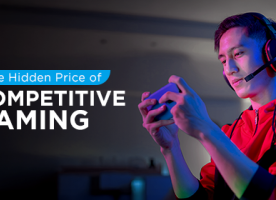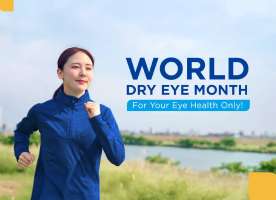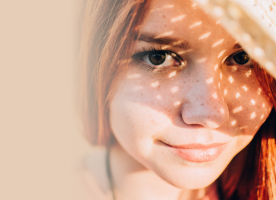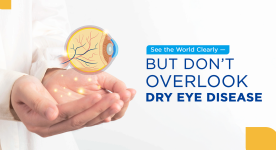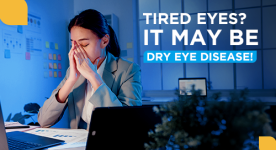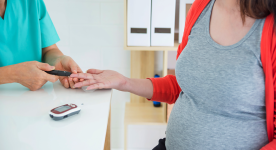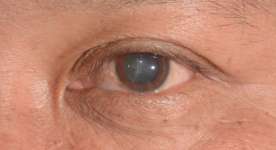How Sleep Disorders May Cause Dry Eyes?
Sleep disorders are a public health problem, affecting 10% - 30% of adults1 and 30% - 48% of the elderly2 worldwide. Dry eye disease (DED) is also a growing public health concern, affecting 4.4% to 50% of above-middle-aged people globally and lowering their quality of life.3 Many studies have pointed out that sleep disorders may be one of the dry eye causes.
Sleep and Sleep disorders
Sleep is a daily and critical need to maintain mental and physical health. How much sleep one needs depends on age. It is recommended to sleep 12-16 hours for infants (4-12 months), 11-14 hours for toddlers (1-2 years), 10-13 hours for pre-school children (3-5 years), 9-12 hours for school-age children (6-12 years), 8-10 hours for teenagers (13-18 years), and at least 7 hours for adults (above 18 years).4 Sufficient sleep is essential, and so is good sleep quality. Low sleep quality is expressed through restless sleep, feeling sleepy or tired even when getting enough sleep, snoring, or gasping for breath. Insufficient and poor-quality sleep is related to dry eyes10 as well as many chronic diseases, namely depression, heart disease, and type-2 diabetes.5
Sleep disorders are medical conditions that affect the duration and quality of sleep. Sleep disorders include four major types:6-8
 Insomnia
Insomnia
Insomnia is the most common sleep disorder. Patients with insomnia have difficulty initiating sleep or staying asleep or wake up several hours early and cannot get back to sleep.
 Narcolepsy
Narcolepsy
Narcolepsy is a chronic condition characterized by excessive daytime sleepiness and sometimes by sudden muscle weakness (cataplexy) stimulated by strong emotion or surprise.
 Restless Legs Syndrome (RLS)
Restless Legs Syndrome (RLS)
RLS, also known as Willis-Ekbom disease, is regularly associated with abnormalities in dopamine. It is specified by the uncontrollable desire to move your legs to ease the unpleasant sensation of sitting or lying down. This condition often causes difficulties falling asleep and disrupts sleep, leading to daytime drowsiness.
 Sleep Apnea
Sleep Apnea
Sleep apnea is a condition in which breathing is repeatedly interrupted during sleep. Its symptoms include loud snoring, gasping for air, awakening with a dry mouth, morning headache, etc..
Sleeping disorders can be a risk factor for DED
Several potential mechanisms have been proposed to explain why sleep disorders cause dry eyes, in which the main reasons are attributed to the reduction of tear secretion and stability.9,10 In detail, sleep disorders may:
 Lower levels of androgens, which facilitates lacrimal and meibomian gland function. Decreased androgen levels might link to increased evaporation of tears, leading to dry eye.
Lower levels of androgens, which facilitates lacrimal and meibomian gland function. Decreased androgen levels might link to increased evaporation of tears, leading to dry eye.
![]() Disarrange biological rhythms based on which tear secretion is regulated, hence, disrupting its activity.
Disarrange biological rhythms based on which tear secretion is regulated, hence, disrupting its activity.
![]() Decrease the nervous system that controls activities of the body during rest including lacrimation, resulting in a rapid reduction in tear flow.
Decrease the nervous system that controls activities of the body during rest including lacrimation, resulting in a rapid reduction in tear flow.
Dry eyes may also disturb sleep
Although the causation relationship has not been clearly established, many studies have suggested that DED may degrade sleep quality.11,12 Sleep disorders including daytime sleepiness, insomnia, and short sleep duration were significantly associated with symptoms of dry eyes.13 More importantly, topical eyedrop treatment gave a significant improvement in sleep quality to newly diagnosed DED patients, demonstrating that DED may cause sleep problems. This can be explained by two hypotheses:
1. Patients may be distressed by DED symptoms such as ocular discomfort, eye fatigue by blurring, and light sensitivity.
2. A decrease in tear secretion entraps inflammation molecules and microorganisms on the ocular surface, leading to ocular irritation and sleep difficulties.12
How to improve your sleep and alleviate dry eyes
Due to their bidirectional relationship, mitigating symptoms of DED will help improve sleep quality and vice versa. Below are some tips to help you get better sleep:
- Avoid using electronic devices before bed: spending lots of time on digital devices such as smartphones, computers, and television can decrease the blinking rate, leading to eye strain and dry eyes. Blue light from gadgets also causes trouble in falling asleep.14 So, put your phone and tablet away, and turn off the TV and laptop.
- Increase humidity in the air: if your bedroom is dry, especially in winter, set humidifiers to reduce dry eyes when waking up.
- Remove contact lenses: unless your lenses are designed for nighttime, remember to take them off before bed.
- Moisturize eyes at night: you can use several types of eyedrops, gels, and ointments before sleeping. It is better to consult your ophthalmologist before use.
- Wash your sheets: regularly wash your sheets to remove irritants to your eyes.
- Practice good sleep habits: go to bed and get up at consistent times; make sure your bedroom is in comfortable conditions (quiet, dark, and suitable temperature); avoid large meals and stimulants before bed; get some exercise.
When to see a doctor
If you have serious or chronic sleep problems and your DED symptoms still persist, you should consult a doctor.

- Bhaskar, S.; Hemavathy, D.; Prasad, S. Prevalence of Chronic Insomnia in Adult Patients and Its Correlation with Medical Comorbidities. J. Fam. Med. Prim. Care 2016, 5 (4), 780. https://doi.org/10.4103/2249-4863.201153.
- Patel, D.; Steinberg, J.; Patel, P. Insomnia in the Elderly: A Review. J. Clin. Sleep Med. 2018, 14 (06), 1017–1024. https://doi.org/10.5664/jcsm.7172.
- Uchino, M.; Schaumberg, D. A. Dry Eye Disease: Impact on Quality of Life and Vision. Curr. Ophthalmol. Rep. 2013, 1 (2), 51–57. https://doi.org/10.1007/s40135-013-0009-1.
- CDC. Sleep for good health. Centers for Disease Control and Prevention. https://www.cdc.gov/sleep/features/getting-enough-sleep.html (accessed 2022-09-12).
- CDC. Sleep and Sleep Disorders. Centers for Disease Control and Prevention. https://www.cdc.gov/sleep/index.html (accessed 2022-09-12).
- CDC - Key Sleep Disorders - Sleep and Sleep Disorders. https://www.cdc.gov/sleep/about_sleep/key_disorders.html (accessed 2022-09-12).
- Sleep apnea - Symptoms and causes. Mayo Clinic. https://www.mayoclinic.org/diseases-conditions/sleep-apnea/symptoms-causes/syc-20377631 (accessed 2022-09-13).
- Restless legs syndrome - Symptoms and causes - Mayo Clinic. https://www.mayoclinic.org/diseases-conditions/restless-legs-syndrome/symptoms-causes/syc-20377168 (accessed 2022-09-13).
- Zheng, Q.; Li, S.; Wen, F.; Lin, Z.; Feng, K.; Sun, Y.; Bao, J.; Weng, H.; Shen, P.; Lin, H.; Chen, W. The Association Between Sleep Disorders and Incidence of Dry Eye Disease in Ningbo: Data From an Integrated Health Care Network. Front. Med. 2022, 9, 832851. https://doi.org/10.3389/fmed.2022.832851.
- Lim, E. W. L.; Chee, M. L.; Sabanayagam, C.; Majithia, S.; Tao, Y.; Wong, T. Y.; Cheng, C.-Y.; Tong, L. Relationship Between Sleep and Symptoms of Tear Dysfunction in Singapore Malays and Indians. Investig. Opthalmology Vis. Sci. 2019, 60 (6), 1889. https://doi.org/10.1167/iovs.19-26810.
- Almutairi, R.; Algezlan, S.; Bayamin, R.; Alrumaih, S.; Almutairi, R.; Alkahtani, R.; Almazrou, A. A. The Association Between Dry Eye and Sleep Quality Among the Adult Population of Saudi Arabia. Cureus 2022. https://doi.org/10.7759/cureus.22736.
- Ayaki, M.; Toda, I.; Tachi, N.; Tsubota, K.; Negishi, K. Preliminary Report of Improved Sleep Quality in Patients with Dry Eye Disease after Initiation of Topical Therapy. Neuropsychiatr. Dis. Treat. 2016, 329. https://doi.org/10.2147/NDT.S94648.
- Lee, W.; Lim, S.-S.; Won, J.-U.; Roh, J.; Lee, J.-H.; Seok, H.; Yoon, J.-H. The Association between Sleep Duration and Dry Eye Syndrome among Korean Adults. Sleep Med. 2015, 16 (11), 1327–1331. https://doi.org/10.1016/j.sleep.2015.06.021.
- Gupta, P.; Rana, M.; Ratti, M.; Duggal, M.; Agarwal, A.; Khurana, S.; Jugran, D.; Bhargava, N.; Ram, J. Association of Screen Time, Quality of Sleep and Dry Eye in College-Going Women of Northern India. Indian J. Ophthalmol. 2022, 70 (1), 51. https://doi.org/10.4103/ijo.IJO_1691_21.
Five‐item Dry Eye Questionnaire (DEQ-5).
관련 게시물
Five‐item Dry Eye Questionnaire (DEQ-5).
Five‐item Dry Eye Questionnaire (DEQ-5).

